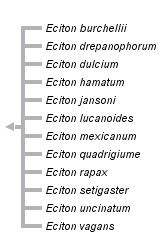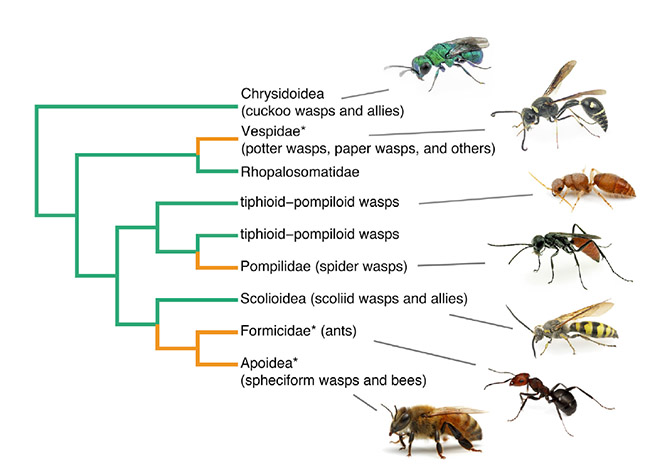Classification
Domain: Eukarya
---Kingdom: Animalia
------Phylum: Arthropoda
---------Class: Insecta
------------Order: Hymenoptera
---------------Family: Formicidae
------------------Genus: Eciton
---------------------Species: Eciton burchellii
Domain
The Army Ant is in the domain of Eukarya because of its
true cellular orientation. The
Pearl Oyster Mushroom is another organism in the domain
Eukarya.
Kingdom
It is further divided into the Animalia Kingdom for its
characteristic of feeding off of other organisms. They are
specifically detritivores because they feed off of partially
decomposed dead material in a technical sense (Encyclopedia of
life 2013). Another example of a Kingdom Animalia species is the
Domestic Chicken.
Phylum
Eciton burchellii is in the Phylum Arthropoda because they are
bilaterally symmetrical protostomes (symmetrical between one
longitudinal plane of symmetry with the mouth forming first in
growth) and strong, segmented bodies. They also have a
chitinous exoskeleton and a mostly open hemocoel circulatory
system (Animal
diversity 2012). Another organism in the Arthropoda phylum is
Lucilia sericata (Common Green Bottle Fly).
Class
Eciton burchelii have a head, thorax, and abdomen, one
of the main characteristics of the Insecta Class. Another
organism in the Insecta Class is the
Pennsylvania Firefly.
Order
Hymenoptera
is Greek for “membrane” and “winged”; Army Ants have membranes
and a portion of Army Ants are, in fact, winged (although the
queen is not). Another characteristic that puts them in the
Hymenoptera Order is their social behaviors and queen-worker
social stratification system (Hymenoptera
1994). Another organism in the Hymenoptera Order is the
Black Ant.
Family
Ants are placed in their own Family: Formicidae; an
Army Ant is definitely an ant.  Another
example of an ant in the Formicidae Family is
Cataglyphis bombycina.
Another
example of an ant in the Formicidae Family is
Cataglyphis bombycina.

Genus
A unique characteristic that
keeps Genus Eciton separate from the rest of the Formicidae family is that
the queen does not have wings.
Species
The two most studied species in
the Eciton genus are burchellii and hamatum. Species
hamatum
are column raiders (they branch out evenly over a distance, like
a tree), whereas burchellii are swarm raiders (they form a
fan-shaped swarm front from a smaller column front linking back
to the bivouac).